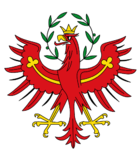National Council (Tirol)
National Council of Tirol Cunsëi dl Tirol | |
|---|---|
| Type | |
| Type | of the Legislature of Tirol |
| Leadership | |
Julia Marc since 4 November 2017 | |
| Structure | |
| Seats | 700 |
 | |
Political groups |
|
Length of term | 6 years |
| Elections | |
| Closed-list Proportional Representation | |
Last election | 5 May 2017 |
Next election | 5 May 2023 |
| Meeting place | |
| Council chamber Innsbruck, Tirol | |
 |
|---|
| This article is part of a series on the politics and government of Tirol |
The National Council (Ladin: Cunsëi dl Tirol) is the lower house of the Tiroler legislature. It is the only body that is directly elected by proportional representation. The council was established by Article 4 of the 1892 Constitution as one of the legislative bodies of Tirol and thus it is the historical successor to the earlier Royal Diet.
The Deputies of the National Council are representatives of the Tiroler people as a whole and are not bound by any orders or instructions and are only held accountable by their electorate. The legal number of members of the council is 700.
The National Council is elected every six years by Tiroler citizens over the age of 17. Elections use a closed-list proportional system in which the proportions of votes for each party are directly translated into the number of deputies each party holds in the council, with each party determining a list of candidates in priority order. An early election is possible in cases where the government no longer commands the confidence of the council, and if 351 deputies vote for a motion of no confidence, the government is dissolved, and if no new government commands the confidence of the council within a two week period, fresh elections are called. Deputies elected in mid-term elections following a vote of no-confidence only hold office until the end of the original term of government in order to preserve the six year cycle and 5 May election dates.

